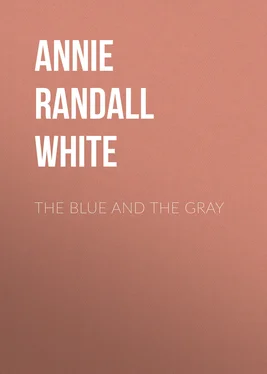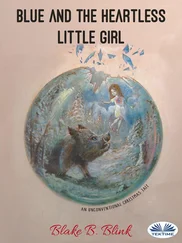Annie Randall White - The Blue and The Gray
Здесь есть возможность читать онлайн «Annie Randall White - The Blue and The Gray» — ознакомительный отрывок электронной книги совершенно бесплатно, а после прочтения отрывка купить полную версию. В некоторых случаях можно слушать аудио, скачать через торрент в формате fb2 и присутствует краткое содержание. Жанр: foreign_prose, История, foreign_edu, foreign_antique, на английском языке. Описание произведения, (предисловие) а так же отзывы посетителей доступны на портале библиотеки ЛибКат.
- Название:The Blue and The Gray
- Автор:
- Жанр:
- Год:неизвестен
- ISBN:нет данных
- Рейтинг книги:3 / 5. Голосов: 1
-
Избранное:Добавить в избранное
- Отзывы:
-
Ваша оценка:
- 60
- 1
- 2
- 3
- 4
- 5
The Blue and The Gray: краткое содержание, описание и аннотация
Предлагаем к чтению аннотацию, описание, краткое содержание или предисловие (зависит от того, что написал сам автор книги «The Blue and The Gray»). Если вы не нашли необходимую информацию о книге — напишите в комментариях, мы постараемся отыскать её.
The Blue and The Gray — читать онлайн ознакомительный отрывок
Ниже представлен текст книги, разбитый по страницам. Система сохранения места последней прочитанной страницы, позволяет с удобством читать онлайн бесплатно книгу «The Blue and The Gray», без необходимости каждый раз заново искать на чём Вы остановились. Поставьте закладку, и сможете в любой момент перейти на страницу, на которой закончили чтение.
Интервал:
Закладка:
"He's the right sort," Bill chuckled to himself.
With that thought in his mind, Ralph went nearer to Charlie, and said—"Give me your handkerchief, and I will bandage your ankle." In a few moments he had finished binding it on, tightly and skillfully, while the boy looked his gratitude.
"It feels a little easier," he said, "the pain was intense." Bill watched them both narrowly. In his heart he admired "the little rebel cuss," but he wished him a thousand miles away, for he saw that it was impossible to make their escape, as Charlie had only to raise his voice as he had suggested, and the enemy would be upon them.
It was a moment of anxiety for the man and his companion. Charlie was the most indifferent of the three. "I'd rather have been killed than have to go to their prison, for who knows how long it may be before I am exchanged?" thought Bill.
The firing had ceased, and darkness had settled o'er the earth. Suddenly Charlie seemed to recollect something, for he whispered—"Go—you must go, at once. The detail will soon be here, to bury our poor boys, and they will have you, sure. Go down the bluff as still as you can; don't loosen a pebble even, for there are sharp ears near. Keep close to the river bank, and about half a mile down you'll see an old tree standing that has been struck by lightning. Two rods north of the tree a little skiff is hid in the tall weeds. Take it and row across. Go quick, and, above all, make no noise. My life, as well as yours, is in danger. They'd shoot me in a minute, if they knew I helped you escape."
"You're a brick—you are!" broke out Bill, admiringly. Ralph wrung his hand. "What will you do? You can't lie here all night."
"They'll find me all right and carry me off to the hospital. I can talk, if I can't walk, and I'll soon let them know where I am. But you haven't a second to waste. Go!"
The hint, so urgently given, was acted upon, and none too speedily, for a moment after, the men appeared, and Charlie was suddenly seized with a violent fit of coughing, so loud and boisterous, it was well calculated to cover any noise which Ralph and Bill might unintentionally make. He was placed on a litter and borne away.
Bill scarce drew a breath until his feet touched the bottom of the boat. Charlie's violent cough had served them well, for though they stole noiselessly down the bluff, the night was so still that a breath almost could be detected. They were soon across the noble river, and their hearts beat tumultuously when they found themselves safe within the Union lines.
Bill's wound was not serious, so he declared. He even objected to the few days in the hospital which the surgeon prescribed. His good nature never left him.
"Sick men may go and lay up, but you cain't kill Old Bill. I'm presarved for something better than to stop a bullet. I've been through too many hard sieges to give in for a little blow like that was."
"You've got another invite to see the Colonel," a grizzled old soldier said to Ralph a day or two after the engagement. "He desires the pleasure of your company in his tent. Leastwise, that's what it amounts to, though that ain't the language he made use of. Wonder why I don't be asked once in awhile? He don't know what he's losing by not consulting me. But hurry up—'tain't perlite to keep him waiting."
Ralph trembled visibly, and every drop of blood turned to ice. He knew something must be wrong. Perhaps he ought not to have helped Charlie, but what else could he do? He walked briskly toward the tent of the officer.
Colonel Hopkins was a stern, battle-scarred old soldier, who wasted no words. His keen vision could discover merit, however, and as he looked steadily at Ralph, he took his measure at once.
"Your captain tells me you saved the colors of the regiment, in the late engagement?"
"I did, Colonel."
"And you risked your life in so doing."
"Why should I not? I am a soldier, sir!" and the boy's "I will, with the help of Heaven!" was Ralph's fervent utterance, as he followed the orderly from the Colonel's tent.
One of the most brilliant affaire of the war was the charge of a body of cavalry under Fremont. This was a fine and choice array of cavalry, known as "Fremont's Body Guard," whose exploits were famous. It was commanded by Major Charles Zagonyi, a Hungarian, whose military record had been made in Europe.
This dashing and fiery soldier, with a band of 160 men, charged upon a Confederate force of 2,000, who were drawn up in a hollow square. He rode across the field, unheeding the firing of the skirmishers, but charged into the midst of the Confederates, and with pistols and sabers, scattered them like dry leaves in the autumn wind. Not content with this, the daring Major chased them into the streets of Springfield, and fought them hand to hand.
After this daring and unequaled achievement, he hoisted the National flag upon the courthouse at Springfield, sent a guard to care for the wounded, and then went quietly back to Bolivar.
CHAPTER VIII. THE ARMY IN WINTER QUARTERS
WINTER so far had brought them much suffering and privation. To Ralph it was peculiarly dreary. With the prospect of a period of inactivity, it was strange that so little provision was made to protect them from the cold, raw winds that were so frequent. Many of the soldiers put up rude huts, made from the fine timber which grew so plentiful in that region, and those who were independent and enterprising enough to build for themselves, often fashioned a very snug, cozy little house. The rough stone fireplace, put together with Virginia mud, was never wanting. What though it was neither symmetrical nor artistic? The warmth and cheer compensated for the absence of both these features.
In some of these huts—they surely deserved a better title—the men threw themselves down at night on the ground, which was covered with blankets, rubber coats, and any material the jovial occupants could find to keep out the dampness. Some, more pretentious, constructed bunks or boxes round the sides, which were as comfortable as a spring bed would be at home. It was quite common to find home-made chairs, benches and tables, round which they gathered when off duty, and told stories or discussed the situation. The walls were papered with illustrations cut from newspapers, which added to the charms of the dwelling.
But the greater number shivered under canvas tents, feeling keenly the light snows and rains, followed by days of thaw and sunshine, which were so frequent. To add to the dreariness of their surroundings, the funeral dirge was often heard, as the dead were carried out from hospital, who had succumbed to that apparently simple disease, the measles, but which leaves its victim feeble, exhausted, and unable to rally.
To a new recruit, or to one who is full of sensibility, as Ralph was, these sights were particularly depressing.
A snowstorm during the day had been succeeded by a windy, cold night. Ralph had been writing to his mother, and while he took care to make every word as cheerful as he could, and never to mention his discomforts, vet the mother heart between the lines, and knew her boy was homesick, pining for her, as she, alas! was longing for the loving caress and the sound of his voice.
As he pushed back the stool which had answered for a writing desk, the wind gave a sudden whirl and lifted the canvas, sending a shower of sleet over him which made him shiver.
"The winter here is full as cold and disagreeable as up North!" he said. "I thought this was a land of perpetual sunshine and flowers!"
He peered out at the sentry, who hugged his great coat closer, as he paced to and fro. He fancied he saw in the gloom a man and horse, and heard the sharp challenge—
"Halt! Who goes there?"
The horseman drew up, and replied promptly—
Читать дальшеИнтервал:
Закладка:
Похожие книги на «The Blue and The Gray»
Представляем Вашему вниманию похожие книги на «The Blue and The Gray» списком для выбора. Мы отобрали схожую по названию и смыслу литературу в надежде предоставить читателям больше вариантов отыскать новые, интересные, ещё непрочитанные произведения.
Обсуждение, отзывы о книге «The Blue and The Gray» и просто собственные мнения читателей. Оставьте ваши комментарии, напишите, что Вы думаете о произведении, его смысле или главных героях. Укажите что конкретно понравилось, а что нет, и почему Вы так считаете.











